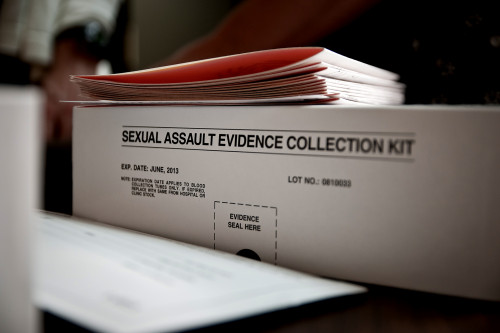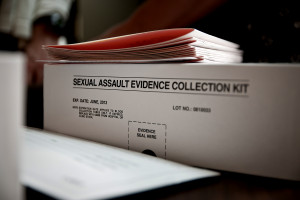Colorado Criminal Law – The Right Of An Alleged Sex Assault Victim To Refuse To Cooperate With Authorities
By H. Michael Steinberg Colorado Sex Crimes Criminal Defense Lawyer

_______________________
Colorado Criminal Law – The Right Of An Alleged Sex Assault Victim To Keep Her Case Anonymous
Colorado Criminal Law – The Right Of An Alleged Sex Assault Victim To Refuse To Cooperate With Authorities – The right of the individual, usually a woman, to maintain some measure of control over her life’s decisions when she is the alleged victim of domestic violence and/or sexual assault, has been slowly and seriously eroded over the last three decades under Colorado law.
This article explores rights of victims to decide whether or not to submit physical evidence to law enforcement for prosecution of sexual assault.
Recently enacted Colorado laws restore some autonomy to alleged victims of sexual assault over the decision of whether forensic evidence in the form of samples taken during the investigation phase of the crime are submitted to law enforcement.
Alleged Colorado Sexual Assault Victims Have To Provide “Authorization” To Perform Medical Forensic Exam On Their Bodies
Bottom line – it is the alleged victim of a sexual assault who makes the decision to allow for a deeply intrusive and difficult medical forensic exam – and then whether the results of that exam are disclosed to the police and Colorado prosecutors for the prosecution of the case
Colorado Law 23-33.5-113 – Forensic Medical Evidence in Sexual Assault Cases
Known as the SEXUAL ASSAULT EVIDENCE COLLECTION AND TESTING LAW- (Colorado’s DNA Testing and Storage Law) – Colorado law provides for the use of so called Sexual Assault “Kits” in the investigation and prosecution of the crime of sexual assault.
That law is 24-33.5-113 – went into effect on March 1, 2014.
The law provides, among other things, that forensic evidence must be collected if an alleged sexual assault victim requests it to be collected but, more importantly, law enforcement and medical personnel must obtain the consent of the alleged victim prior to the taking of the medical evidence and, furthermore, her consent is required before that evidence may be used for the prosecution of a possible charge of sexual assault.
Whether the alleged victim of a sexual assault decides to remain anonymous or not – she has a right to have the evidence collected. She has the right to compel the law enforcement agency with jurisdiction over the alleged sexual assault crime to pay for any direct cost associated with the collection of that forensic evidence.
Their Arm Limits On The Demand Of The Police That An Alleged Victim Fully “Participate” In The Prosecution Of A Sexual Assault Case
Known as “forensic compliance” under the Violence Against Women Act (VAWA) – the idea behind this relatively new law (24-33.5-113 ) is to try to restore an alleged sexual assault victims’ ability to access free medical forensic exams without the requirement of participation with a law enforcement investigation.
Another law, 18-3-407.5(3)(a) adds additional protections to the alleged victim’s rights.
C.R.S. 18-3-407.5(3)(a)
“A law enforcement agency, prosecuting officer, or other government official may not ask or require a victim of a sexual offense to participate in the criminal justice system process or cooperate with the law enforcement agency, prosecuting officer, or other government official as a condition of receiving a forensic medical examination that includes the collection of evidence”
A Subtle Form Of Coercion – Financial Assistance for Sexual Assault Victims
A hitch – financial assistance under Colorado’s “Victim Compensation Program,” (which provides assistance with medical bills), REQUIRES, BEFORE assisting alleged victims with bills related to the alleged crime, that the victim has “cooperated fully with law enforcement officials.”
Colorado’s Victim Compensation Program (C.R.S. 24-4.1-101)
The “Victim’s Comp” Fund
“Colorado victim’s compensation is available to sexual assault victims who have reported the assault to law enforcement and are cooperating with the investigation. Victims may be eligible to receive up to $20,000 for certain out-of-pocket expenses not covered by insurance or other collateral resources, or up to $1,000 in emergency funds directly related to the crime.
2. The victim must cooperate with law enforcement officials (e.g. district attorney, police, sheriff). 1. The crime must be one in which the victim sustains mental or bodily injury, dies, or suffers property damage to locks, windows or doors to residential property as a result of a compensable crime. 3. The law enforcement agency was notified within 72 hours after the crime occurred.
4. The injury or death of the victim was not the result of the victim’s own wrongdoing or substantial provocation.
5. The victimization occurred on or after July 1, 1982.
6. The application for compensation must be submitted within one year from the date of the crime; six months for residential property damage claims.
Also Mandatory Reporting for Medical Professionals Where There Is A Suspicion Of Sexual Assault …Is Still Required And Not Affected
Under Colorado law – C.R.S. 12-36-135 (1) – ANY injury that occurs due to a suspected criminal act must be reported to the law enforcement agency in the treating facility’s jurisdiction.
C.R.S. 12-36-135. Injuries to be reported – penalty for failure to report – immunity from Liability
(1) It shall be the duty of every licensee who attends or treats a bullet wound, a gunshot wound, a powder burn, or any other injury arising from the discharge of a firearm, or an injury caused by a knife, an ice pick, or any other sharp or pointed instrument that the licensee believes to have been intentionally inflicted upon a person, or any other injury that the licensee has reason to believe involves a criminal act, including injuries resulting from domestic violence, to report such injury at once to the police of the city, town, or city and county or the sheriff of the county in which the licensee is located.
Any licensee who fails to make a report as required by this section commits a class 2 petty offense, as defined by section 18-1.3-503, C.R.S., and, upon conviction thereof, shall be punished by a fine of not more than three hundred dollars, or by imprisonment in the county jail for not more than ninety days, or by both such fine and imprisonment.
(1.5) As used in subsection (1) of this section, unless the context otherwise requires:
(a) “Domestic violence” means an act of violence upon a person with whom the actor is or has been involved in an intimate relationship. Domestic violence also includes any other crime against a person or any municipal ordinance violation against a person when used as a method of coercion, control, punishment, intimidation, or revenge directed against a person with whom the actor is or has been involved in an intimate relationship.
(b) “Intimate relationship” means a relationship between spouses, former spouses, past or present unmarried couples, or persons who are both the parents of the same child regardless of whether the persons have been married or have lived together at any time.
Most Colorado jurisdictions, even over the objections of the alleged sexual assault victim, provide the name of the alleged victim to the relevant law enforcement agency. BUT an alleged victim of sexual assault does has the right to refuse to have forensic samples removed from her body, used in a trial to prosecute the alleged perpetrator.
This restores some control to the alleged victim of sexual assault in the State of Colorado.
Two Different Types Of Alleged Victims Of Colorado Sexual Assault
Colorado has created two different reporters of alleged “victims” of sexual assault based on whether they decide to report, or not to report, the crime to local law enforcement.
Medical Reporting Victims: These are alleged victims of sexual assault who seek medical services following a sexual assault but elect not to participate in the criminal justice system at the time of receiving medical services.
Law Enforcement Reporting Victims: These are alleged victims sexual assault who report the assault to law enforcement prior to, at the time of, or independent of, a medical forensic exam.
Put differently, Medical Reporting Victims remain anonymous by choosing to receive a medical forensic exam but then choosing NOT to permit the further use of that evidence by the criminal justice system. They have the right to choose NOT to reveal any “identifying information” to law enforcement.
The Forensic Evidence Kit In Colorado Sexual Assault Cases
Three forms are provided to law enforcement and medical authorities under these circumstances.
1. The Sexual Assault Incident Form
2. The Colorado Sexual Assault CONSENT AND INFORMATION FORM (SEX ASSAULT EVIDENCE CONSENT FORM); and
3. Colorado Sexual Assault ANONYMOUS REPORTING Consent and Information Form.
While the Sexual Assault Incident Form is always filled out – only ONE of the two different types of consent forms is filled out. If the alleged sexual assault victim decides NOT to have evidence collected, a report of the sexual assault is not required other than routine hospital forms.
The Colorado Sexual Assault Evidence Collection Protocol allows the alleged victim to decide which form to fill out.
1. Medical Forensic Exam
The patient or consenting party must initial this section if s/he is consenting to a medical forensic exam. Initials here indicate the patient or consenting party consents to the exam and understands s/he can stop the exam at any time and decline any portion of the exam or collection of any sample.
2. Reporting Decision
The patient or consenting party initials one of the two choices.
Initials next to the “I am choosing to make a report to law enforcement” paragraph indicate the patient is opting for a law enforcement report. This means the patient consents to evidence collection and to have the evidence and contact information, released to law enforcement. This choice also means the patient is willing to participate in a law enforcement investigation, if one occurs.
“I am choosing NOT TO REPORT TO LAW ENFORCEMENT OR PARTICIPATE”
paragraph indicate the patient is opting for a medical report. This means
the patient consents to evidence collection, and to have that evidence and her or his
name and contact information released to the appropriate law enforcement agency;
however, the patient is also declining, at that time, to participate in an investigation.”
3. Evidence Analysis/Release of Results
“I consent for law enforcement to release the collected evidence to a
forensic lab for analysis” paragraph means the patient consents to analysis of evidence
and understands law enforcement will receive the results of any testing performed.
Initials next to the “I consent only to the collection and storage of evidence”
paragraph mean the patient consents only to the storage of evidence. The evidence
will not be submitted for analysis.”
4. Withdrawal of Consent for Evidence Analysis/Release of Results
This section applies only to patients 18 years of age or older. Mandatory reporting laws prevent minors from withdrawing consent for testing.
Colorado Criminal Law – The Right Of An Alleged Sex Assault Victim To Refuse To Cooperate With Authorities
If you found any of the information I have provided on this web page article helpful please click my Plus+1 or the Share buttons below so that others may also find it.
Never stop fighting – never stop believing in yourself and your right to due process of law.
ABOUT THE AUTHOR: H. Michael Steinberg – Email The Author at [email protected] – A Denver Colorado Criminal Defense Lawyer – or call his office at 303-627-7777 during business hours – or call his cell if you cannot wait and need his immediate assistance – 720-220-2277. Attorney H. Michael Steinberg is passionate about criminal defense. His extensive knowledge and experience of Colorado Criminal Law gives him the edge you need to properly handle your case.
 You should be careful to make a responsible choice in selecting a Colorado Criminal Defense Lawyer – and we encourage you to “vet” our firm. Over the last 40 plus years – by focusing ONLY on Colorado criminal law – H. Michael has had the necessary time to commit to the task of constantly updating himself on nearly every area of criminal law, to include Colorado criminal law and procedure and trial and courtroom practice.
You should be careful to make a responsible choice in selecting a Colorado Criminal Defense Lawyer – and we encourage you to “vet” our firm. Over the last 40 plus years – by focusing ONLY on Colorado criminal law – H. Michael has had the necessary time to commit to the task of constantly updating himself on nearly every area of criminal law, to include Colorado criminal law and procedure and trial and courtroom practice.
H. Michael works hard to get his clients the best possible results in and out of the courtroom. He has written, and continues to write, extensively on Colorado criminal law and he hopes this article helps you in some small way -Colorado Criminal Law – The Right Of An Alleged Sex Assault Victim To Refuse To Cooperate With Authorities.

